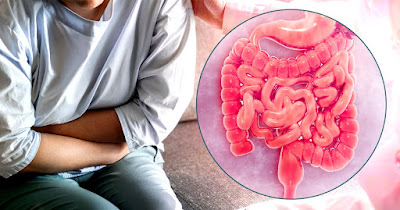The umbrella term chronic inflammatory bowel disease includes clinical pictures in which sections of the large and small intestine, but also other parts of the gastrointestinal tract, become inflamed. This inflammation usually occurs in recurring episodes. The main symptoms are diarrhea and cramping abdominal pain. The most important chronic inflammatory bowel diseases include Crohn's disease and ulcerative colitis.
 |
| chronic inflammatory bowel |
Symptoms
The classic chronic inflammatory bowel diseases Crohn's disease and ulcerative colitis can cause a whole range of similar symptoms, which makes it difficult to differentiate between the two diseases. These include diarrhea and cramping abdominal pain, often associated with a general feeling of illness, exhaustion, fever and nausea. Both Crohn's disease and ulcerative colitis can lead to deficiencies in electrolytes, iron and vitamins, and being underweight. In addition, the inflammation levels in the blood are increased.
With both intestinal diseases there are complaints beyond the gastrointestinal tract, such as joint pain, skin changes and eye inflammation. However, these symptoms are common in Crohn's disease and rather rare in ulcerative colitis. In addition, there are a number of complaints from which those affected tend to suffer with one disease, while they appear less frequently with the other. Ulcerative colitis often presents with very frequent, bloody diarrhea, which rarely occurs in Crohn's disease.
Both classic intestinal diseases generally appear between the ages of 20 and 35, but they can also affect infants and children, while microscopic colitis is mainly detected in women around the age of 65.
There is no complete cure for inflammatory bowel disease, but treatment can alleviate the symptoms and slow down the inflammatory process. In the long term, the main aim of the therapy is to avoid complications and delay operations. Basically, the doctors distinguish between the treatment of an acute attack and a therapy to reduce the attacks, the so-called maintenance of remission. Doctors speak of remission when the symptoms have subsided or disappeared completely. Remission therapy aims to reduce the number of relapses, i.e. to increase the time between relapses.
The symptoms in detail
- Crohn's disease: In Crohn's disease, the entire gastrointestinal tract can become inflamed, but it usually affects the lower section of the small intestine (terminal ileitis) and also the large intestine (Crohn's colitis). All layers of the intestinal wall are affected. It is characteristic of Crohn's disease that the inflammation affects areas that are far apart, which means that it does not spread continuously, but can also jump over areas that remain healthy. The most important drugs in the therapy of Crohn's disease are cortisone preparations that are administered locally as capsules or enemas or systemically as tablets. If cortisone does not help, e.g. in the case of an acute attack with high inflammatory activity, the doctor can administer so-called biologicals such as TNF blockers (tumor necrosis factor blockers, e.g. infliximab). Immunosuppressants (e.g. azathioprine) and TNF blockers can be used to maintain remission. Operations are performed only in the case of complications.
- Ulcerative colitis: Ulcerative colitis mainly affects the large intestine, with the inflammation spreading from the rectum towards the small intestine. However, it only inflames the intestinal mucosa, in contrast to Crohn's disease. A flare-up of ulcerative colitis often starts very suddenly with severe symptoms such as frequent diarrhea with blood and mucus. Complications such as toxic megacolon are life-threatening, and ulcerative colitis also increases the risk of colon cancer. Anti-inflammatory drugs are used to relieve symptoms. Aminosalicylates (e.g. mesalazine) are the most important drugs - oral and rectal - in therapy. In the case of severe attacks, glucocorticoid preparations (e.g. budesonide), immunosuppressants or TNF blockers are used. If the inflammation cannot be controlled with medication, in extreme cases part or all of the colon can be surgically removed.
- Colitis indeterminata: It is not always possible to distinguish between Crohn's disease and ulcerative colitis; in this case one speaks of indeterminate colitis or unclassified inflammatory bowel disease type unclassified (IBDU).
- Microscopic colitis: Collagen and lymphocytic colitis are referred to as microscopic colitis. Typical symptoms are watery diarrhea, accompanied by abdominal pain and nausea. It cannot be detected by endoscopy, but only by examining tissue samples under the microscope. Improvement often occurs when those affected avoid substances that cause diarrhea, such as caffeine and alcohol. The glucocorticoid budesonide is so far the only drug approved for therapy in Switzerland.
The causes of inflammatory bowel disease have not yet been clarified. The fact that chronic inflammatory diseases occur more frequently in certain families speaks in favor of a genetic predisposition. There is also an accumulation in industrialized, western countries, especially in the cities. High standards of hygiene, especially in childhood, diet, medication such as antibiotics, toxins, viruses and bacteria are assumed to be the causes. In certain people, this interaction leads to a malfunction of the immune system in the intestinal cells and possibly to an overreaction of the immune system.
